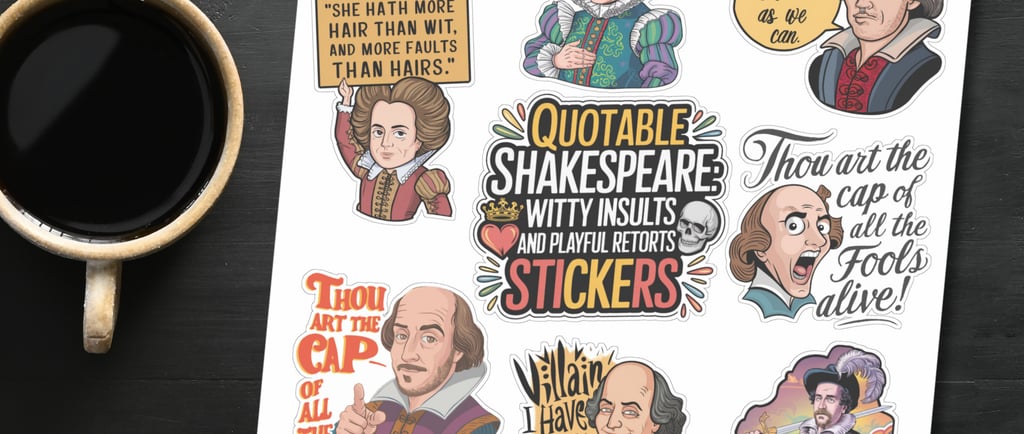Funny Insults from the Bard
Shakespeare: Roasting people since the 16th century. The original master of the artful insult whose burns still sizzle 400 years later.
Rosalind Fairfax
4/30/20253 min read


Funny Insults from the Bard
Shakespeare: Roasting people since the 16th century
Before there were Twitter takedowns or Reddit roasts, there was William Shakespeare, the original master of the artful insult. The Bard had an extraordinary talent for creative put-downs that remain deliciously savage even 400+ years later. Whether you're a Shakespeare scholar or someone who barely made it through English class, these zingers deserve appreciation.
Let's explore some of Shakespeare's most hilarious verbal smackdowns that prove the art of the insult hasn't changed much—only the vocabulary has.
The Elizabethan Burn Master
Shakespeare didn't just write beautiful soliloquies about love and death. He also crafted insults so creative that people still use them today. These weren't just random jabs; they were carefully constructed verbal weapons, designed to entertain audiences while showing off his linguistic prowess.
Top-Tier Shakespeare Burns
"Thou art the cap of all the fools alive!"
From Timon of Athens
Why it slaps: Imagine being told you're not just any fool, but the CHAMPION of fools—the gold medalist in the Foolish Olympics. This insult crowns someone as royalty, but of the worst kind. It's like saying "You're not just clown, you're the entire circus."
"She hath more hair than wit, and more faults than hairs."
From The Two Gentlemen of Verona
Why it slaps: This double-whammy insult suggests someone has a lot of hair but very little intelligence, then twists the knife by saying they have even MORE flaws than they have hairs on their head. The mathematical progression makes this burn particularly devastating.
"Away, you moldy rogue, away!"
From Henry IV, Part 2
Why it slaps: Short, dismissive, and disgusting. Calling someone "moldy" conjures images of forgotten food in the back of the refrigerator. It suggests the person is not only revolting but also past their expiration date. The repeated "away" adds a layer of "I can't even stand to look at you."
"I'll tickle your catastrophe!"
From Henry IV, Part 2
Why it slaps: This bizarre threat is both confusing and menacing. "Catastrophe" in Elizabethan slang could refer to the posterior, making this a creative way to threaten to kick someone's behind. The juxtaposition of the playful "tickle" with the serious "catastrophe" makes it memorably strange.
"Villain, I have done thy mother."
From Titus Andronicus
Why it slaps: The original "yo mama" joke, proving that some insults are truly timeless. Shakespeare understood that implying you've been intimate with someone's mother has been devastating since time immemorial. The directness makes it all the more shocking coming from classical literature.
Why Shakespeare's Insults Still Work
Shakespeare's insults have endured for centuries because they tap into universal aspects of human interaction:
They're creative - Shakespeare never settled for basic insults when he could craft something memorably bizarre
They're specific - Each insult paints a vivid, often grotesque picture
They combine high and low humor - Shakespeare mixed intellectual wordplay with crude jokes
They're adaptable - Even out of context, many work perfectly in modern situations
How to Insult Like Shakespeare
Want to channel your inner Bard when telling someone off? Follow these simple principles:
Stack unexpected adjectives: "Thou tedious, rank, half-faced maggot-pie!"
Compare people to strange things: "You are as a candle, the better part burnt out."
Create new compound words: Try combining "hedge" with "pig" or "weasel" with "eye"
Question their parentage: "Thy mother's name is ominous to children"
Dismiss them dramatically: "Away, you three-inch fool!"
Modern Uses for Shakespearean Insults
These insults aren't just historical curiosities—they're perfectly deployable in modern life:
In traffic: "Away, you scullion! You rampallian! You fustilarian!"
In work emails: "I do desire we may be better strangers" (polite way to say "leave me alone")
In gaming: "More of your conversation would infect my brain"
On dating apps: "I'll not be made a soft and dull-eyed fool"
The Final Word
Shakespeare's insults remind us that while technology changes, the art of the perfect put-down remains essentially the same: be creative, be specific, and when possible, be funny. The next time you're tempted to use a basic modern insult, consider channeling your inner Shakespeare instead.
After all, calling someone a "moldy rogue" or "the cap of all fools alive" is far more memorable than most of what passes for insults today. The Bard knew that if you're going to insult someone, you might as well do it with style.
Looking to add some Shakespearean flair to your own vocabulary? Check out our "Quotable Shakespeare" collection of witty insults and playful retorts stickers at theatrefinery.com.
This post is part of Theatrefinery's ongoing exploration of classical literary works in contemporary context. Visit our Script Revival blog for more content that bridges traditional and modern expression.
